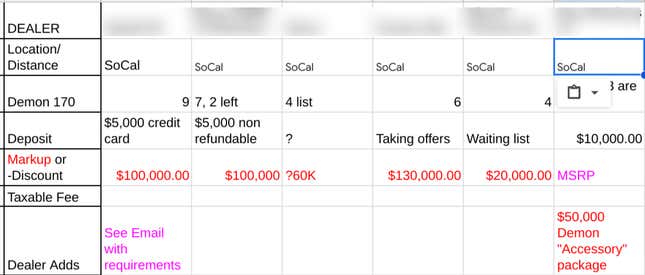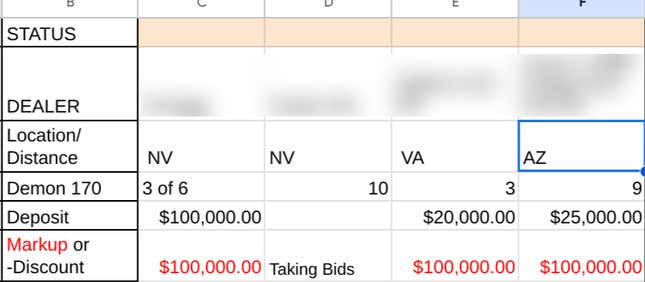The Demon 170 is an ethanol-fueled 1,025-horsepower swan song for the Dodge Challenger nameplate. It’s the last Hemi-powered two-door tire burner you can buy before the brand shifts to its all-electric Daytona muscle car.With a starting price of just under $100,000, the Demon 170 is a screaming bargain considering its power and performance. The problem is that getting this car for that price won’t be easy.
In case you missed it:
- These Are Your Dream Daily-Drivers
- Study Explores How Long Electric Vehicle Batteries Really Last
- Fordlandia: Henry Ford’s Abandoned Company Town in the Amazon Rainforest
The day the Challenger Demon 170 was revealed to the public, I received a number of emails from potential customers asking if my team could help secure them a Demon 170 allocation — without a market premium. Knowing this car was going to be made in limited numbers, and sold by a dealer network that oftentimes embodies the worst car dealership stereotypes, the chances were low.
I quickly reached out to a few contacts in the Detriot metro area who had connections with large dealer groups. The texts I got back all said roughly the same thing: “All the cars are gone and sold for at least $100,000 over MSRP.” Then I hit up a few folks in the Northeast. Only one got back to me, saying they had a slot for “a minimum of $65,000 over MSRP, and we are taking bids.” I did speak with one dealer who sold their single Demon 170 allocation at MSRP to a very loyal customer.
I reported my findings to the interested buyers who had reached out for help. One potential client in California still wanted to contract my services, in hopes that we could pull off a miracle, however unlikely. My team investigated allocations at over 40 dealerships using Dodge’s very helpful “Horsepower Locator,” which tells buyers exactly which dealers have allocations for specific models.
Most of the dealers my team spoke with reported that their allocations were all gone, and admitted that they sold for well over MSRP. Some stores had slots available, with the majority of dealers intending to add markups that would essentially double the price of the Demon 170.
Here is what we found, broken down by region. (Dealer names have been blurred.)
Northern California

Southern California

Nationwide

None of this is surprising — this is, after all, a limited-edition specialty car with enough demand that buyers are willing to drop $200,000 on a Dodge Challenger. There are even some reports of dealers asking upwards of $350,000. But it’s certainly discouraging to anyone hoping to nab a Demon 170 for its base price of $96,666.
My clients keep asking the same questions: Does Dodge even know how bad things are? Do they even care?
With the Demon 170, Dodge put in place a “priority allocation” system, similar to what the company did for the 2018 Demon. Essentially, cars sold at MSRP (or below) get priority and will be built first. (Every Demon 170 is custom-ordered.) Cars that are sold over MSRP are pushed to the back of the line. Naturally, this begs a question: If the majority of these cars are being sold with big markups, how can they all be pushed to the back of the line? And what prevents a dealer from selling the car at MSRP on paper, but adding $50,000 of “accessories” to the total transaction?
So What Is Dodge Doing About Demon 170 Markups?
To find answers, I went straight to the source: Dodge CEO Tim Kuniskis. He told me every confirmed Demon 170 order has to be submitted with a notarized document, signed by the dealer and the customer, indicating whether or not this car was being sold at, below, or above MSRP.
“Our goal is to make 3,000 cars for the U.S. market,” Kuniskis told me. “I don’t know if we will be able to accomplish that, but that’s the goal. We will build the MSRP cars first, and those that paid over MSRP may risk not getting a car.”
Kuniskis said that, right now, Dodge has 1,000 confirmed orders with all the necessary documentation, and 62 percent of those orders are at MSRP. Another 500 orders are in “draft status,” not yet finalized. Order banks for the Demon 170 opened on Monday, March 27th, and the website crashed briefly due to the influx of orders. Dodge released about 2,500 allocations for the Demon 170 at that time, meaning there are potentially up to 1,000 slots yet to be filled. Dealers have until May 14th to get their allocations finalized.
As for stories like the one above, where a dealer is adding a separate $50,000 “accessory package” to an MSRP car, Kuniskis regards it as a fluke. “If those situations are happening, that is a dealer and a customer colluding on a legal document,” he told me. “I have a hard time believing that is happening on most of those MSRP deals.”
Kuniskis also made the point that the release of the Demon 170 could create a cascade effect — customers who previously submitted orders for different special-edition Challengers, like the Hellcat Redeye or Super Stock, could migrate up to the Demon 170, opening build slots for models with less than 1,025 hp.
We all know that automakers are limited in what they can mandate their dealers to do. When it comes to mainstream, legacy automakers, every dealership in the U.S. runs independently of the OEM whose vehicles they sell. There’s one potential solution available to automakers: Build a ton of cars to meet demand. And when it comes to something as specialized as the Demon 170, frankly, a potential run of 3,000 units is a lot of cars.
Kuniskis also acknowledged something we all implicitly understand: The customer base plays a major part in perpetuating these kinds of markups. Dodge can set the MSRP, but the automaker has no control over the market value of a car — that’s determined by buyers. If every Demon 170 customer decided not to pay a dime over sticker price, the dealers would have to adjust their pricing accordingly.
Tom McParland is a contributing writer for Jalopnik and runs AutomatchConsulting.com. He takes the hassle out of buying or leasing a car. Got a car buying question? Send it to Tom@AutomatchConsulting.com